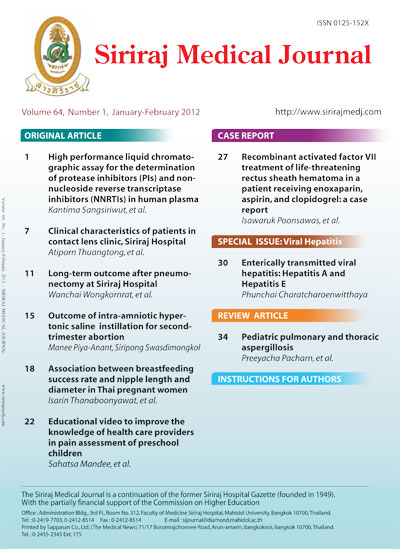Mutational Analyses of K-ras Exon 2 in Thailand Colorectal Cancer Tissue Samples
Keywords:
Mutation, K-ras, exon 2, Thailand and colorectal cancerAbstract
Objective: The main purpose of this study was to elucidate the genotype of K-ras gene in Thailand colorectal cancer tissue samples, especially in exon 2, which has never before been reported.
Methods: 106 patientsั samples in formalin fixed paraffin embedded tissue blocks were investigated in this study. DNA was extracted and PCR was performed by using primers specific for the K-ras gene at exon 2. Direct sequencing was performed in a Genetic Analyser ABI3130 with specific software.
Results: The mutation of K-ras exon 2 gene in Thailand colorectal cancer samples accounted for 37.7% of the total. The most common mutation found in this series was the G➞A transition which accounted for 70%.
Conclusion: The incidence of K-ras exon 2 mutation in Thailand colorectal cancer samples was remarkedly similar to previous reports.
References
2. Ratanawichitrasin A. The Siriraj Cancer Center, Tumour Registry. Bangkok: Supawanich Publishing; 2007: p. 18-32.
3. Sengupta N, Gill KA, MacFie TS, Lai CS, Suraweera N, Mcdonald S, Silver A. Management of colorectal cancer: A role for genetics in prevention and treatment? Pathol Res Practice. 2008 Jun;204(7):469-77.
4. Chung DC. The genetic basis of colorectal cancer: Insights into critical pathways of tumorigenesis. Gastroenterology. 2000 Sep;119(3):854-65.
5. Ross PJ, George M, Cunningham D, DiStefano F, Andreyev HJ, Workman P, et al. Inhibition of Kirsten-ras expression in human colorectal cancer using rationally selected Kirsten-ras antisense oligonucleotides. Mol Cancer Ther. 2001 Nov;1(1):29-41.
6. Malumbres M, Barbacid M. Ras oncogenes: the first 30 years. Nat Rev Cancer, 2003 Jun;3(6):459-65.
7. Schubbert S, Shannon K, Bollag G. Hyperactive Ras in developmental disorders and cancer. Nat Rev Cancer. 2007 Apr;7(4):295-308.
8. Al-Mulla F, Milner-White EJ, Going JJ, Birnie GD. Structural differences between valine-12 and aspartate-12 ras proteins may modify carcinoma aggression. J Pathol. 1999 Mar;187(4):433-8.
9. Andreyev HJN, Norman AR, Cunningham D, Oates J, Dix BR, Lacopetta BJ, et al. Kirsten ras mutations in patients with colorectal cancer: the ‘RASCAL II’ study. Br J Cancer. 2001 Sep;85(5):692-6.
10. Lievre A, Bachet JB, Boige V, Cayre A, Corre DL, Buc E, et al. KRAS mutations as an independent prognostic factor in patients with advanced colorectal cancer treated with cetuximab. J Clin Oncol. 2008 Jan;26(3):374-9.
11. Karapetis CS, Khambata-Ford S, Jonker DJ, O’Callaghan CJ, Tu S, Tebbutt NC, et al. K-ras mutations and benefit from cetuximab in advanced colorectal cancer. N Engl J Med. 2008 Oct;359(17):1757-65.
12. Au HJ, Karapetis CS, OัCallaghan CJ, Tu D, Moore MJ, Zalcberg JR, et al. Health-related quality of life in patients with advanced colorectal cancer treated with cetuximab: Overall and KRAS-specific results of the NCIC CTG and AGITG CO.17 Trial. J Clin Oncol. 2009 Apr;27(11):1822-8.
13. Dieterle CP, Conzelmann M, Linnemann U, Berger MR. Detection of isolated tumor cells by polymerase chain reaction restriction fragment length polymorphism for K-ras mutations in tissue samples of 199 colorectal cancer patients. Clin Cancer Res. 2004 Jan; 10(2):641-50.
14. Kant JA. Direct DNA sequencing in the clinical laboratory. Clin Chem. 1995;41(10):1407-9.
15. Mazars GR, Moyret C, Jeanteur P, Theillet CG. Direct sequencing by thermal asymmetric PCR. Nucleic Acids Res. 1991;19:478-3.
16. Tanahashi T, Kita M, Kodama T, Sawai N, Yamaoka Y, Mitsufuji S, et al. Comparison of PCR-Restriction Fragment Length Polymorphism Analysis
and PCR-Direct Sequencing Methods for Differentiating Helicobacter pylori ureB Gene Variants. J Clin Microbiol. 2000;38:165-9.
17. Roock WD, Piessevaux H, Schutter JD, Janssens M, Hertogh GD, Personeni N, et al. KRAS wild type state predicts survival and is associated
to early radiological response in metastatic colorectal cancer treated with cetuximab. Ann Oncol. 2008 Mar;19(3):508-15.
18. Bazan V, Migliavacca M, Zanna I, Tubiolo C, Grassi N, Latteri MA, et al. Specific codon 13 K-ras mutations are predictive of clinical outcome
in colorectal cancer patients, whereas codon 12 K-ras mutations are associated with mucinous histotype. Ann Oncol. 2002 Sep;13(9):1438-46.
19. Kraus MC, Seelig MH, Linnemann U, Berger MR. The balanced induction of K-ras codon 12 and 13 mutations in mucosa differs from their ratio in neoplastic tissues. Int J Oncol. 2006 Oct;29(4):957-64.
20. David PC. Molecular Biology: Understanding the genetic revolution. Amsterdam: Elsevier Academic Press; 2005. p. 154-96.
21. Wu CM, Tang R, Wang J, Changchien CR, Hsieh LL. Frequency and spectrum of K-ras codons 12 and 13 mutations in colorectal adenocarcinomas from Taiwan. Cancer Genet Cytogenet. 2005Apr;158(1):55-60.
22. Delattre O, Olschwang S, Law DJ, Melot T, Remvikos Y, Salmon RJ. Multiple genetic alterations in distal and proximal colorectal cancer. Lancet. 1989 Aug;2(8659):353-6.
23. Brown K, Buchmann A, Balmain A. Carcinogen-induced mutations in the mouse c-Ha-ras gene provide evidence of multiple pathways for tumor progression. Proc Natl Acad Sci USA. 1990 Jan;87(2):538-42.
24. Cutsem EV, Kohne CH, Hitre E, Zaluski J, Changchien CR, Makhson A, et al. Cetuximab and chemotherapy as initial treatment for metastatic colorectal cancer. N Engl J Med. 2009 Apr;360(14):1408-17.
Downloads
Published
How to Cite
Issue
Section
License
Authors who publish with this journal agree to the following conditions:
Copyright Transfer
In submitting a manuscript, the authors acknowledge that the work will become the copyrighted property of Siriraj Medical Journal upon publication.
License
Articles are licensed under a Creative Commons Attribution-NonCommercial-NoDerivatives 4.0 International License (CC BY-NC-ND 4.0). This license allows for the sharing of the work for non-commercial purposes with proper attribution to the authors and the journal. However, it does not permit modifications or the creation of derivative works.
Sharing and Access
Authors are encouraged to share their article on their personal or institutional websites and through other non-commercial platforms. Doing so can increase readership and citations.











